The stars came out in droves to celebrate once again The Black Movie Soundtrack II hosted by comedian and actor Craig Robinson on Wednesday August 31st at the Hollywood Bowl, Los Angeles.

I’m so proud of this #BlackPanther @chadwickboseman! Hard work pays off👊🏾 Excellent running into you everywhere this week @only1karimah! Lol #Greene #ActorsdoingitWell #TheHollywoodBowl
In attendance were Actors Anthony Anderson, Chadwick Boseman who will play Marvel’s Black Panther, Chad Coleman from ‘The Walking Dead’ and Actresses Skye P. Marshall, Vanessa Bell Calloway and Bresha Webb.
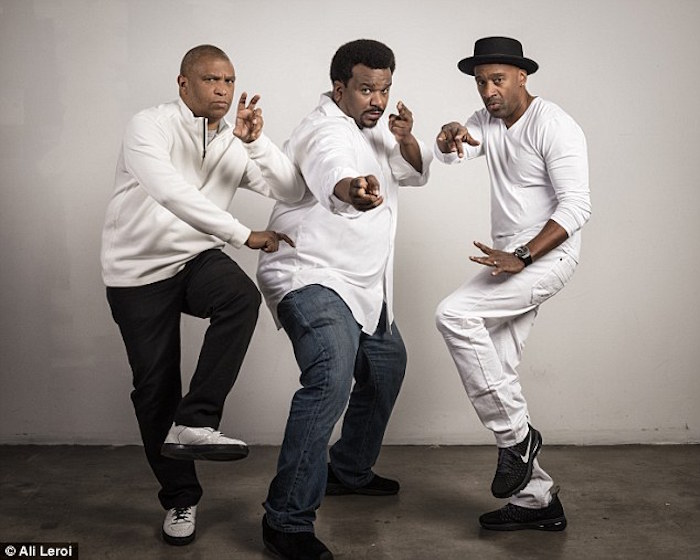
A-Team : Reginald, Craig and Marcus hosted the evening
By popular demand, Grammy winner Marcus Miller and acclaimed producer/director Reginald Hudlin reprise the Bowl’s 2014 Black Movie Soundtrack event with new clips and some funky favorites.
The LA Philharmonic orchestra played 70’s medleys accompanied by the respective films on the screens performed by musicians Charlie Wilson, Babyface and Lalah Hathaway who serenaded to the classics of Shaft, Superfly and Little Ghetto Boy.
Gladys Knight brought the house down as she performed three songs from the film ‘Claudine’. The audience sang along to a vibrant Gladys as she sang ‘Make Yours a Happy Home’, ‘The Makings of You’ and ‘On and On’.
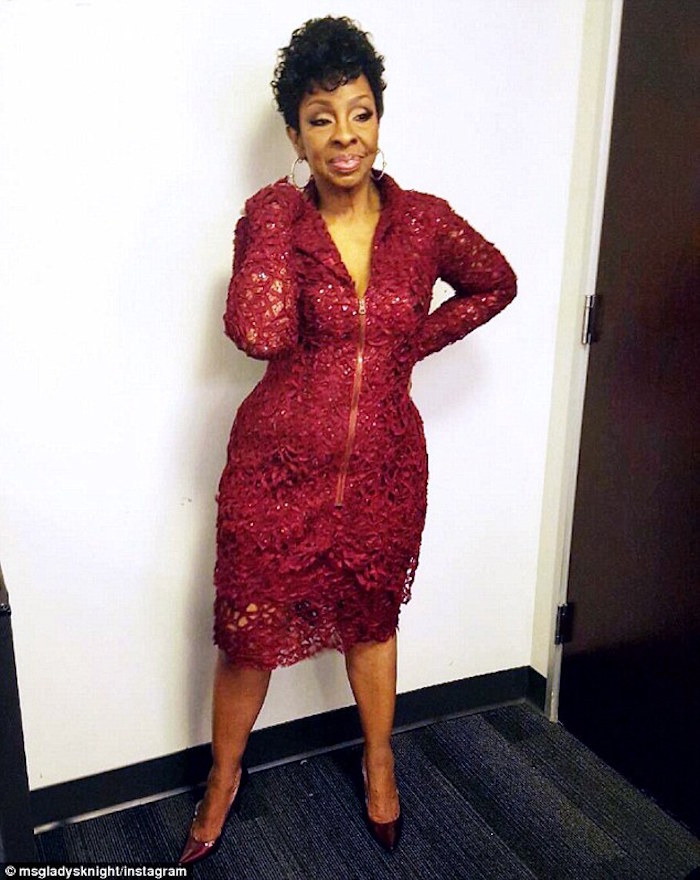
Lady in red: Gladys Knight wrote on her instagram that she had an amazing night
Highlight of the evening was a touching tribute to the passing of Earth Wind and Fires Maurice White who passed away earlier this year on February the 4th.
The remaining members of the band lit up the night as they performed their chart toppers, ‘Got to Get You into My Life’ , ‘That’s The Way of the World’ and the infectious ‘September’.
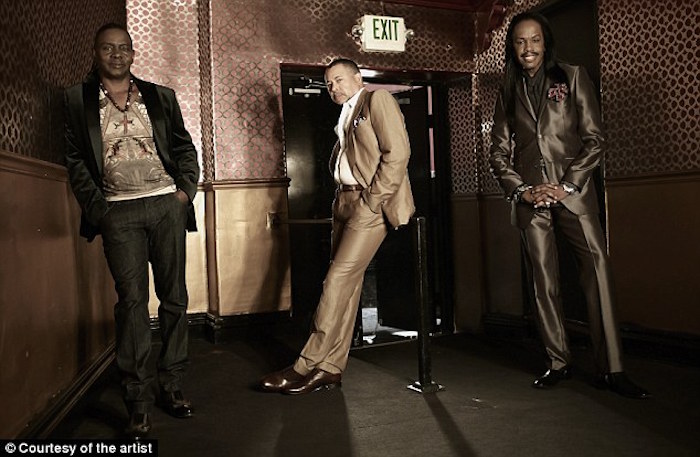
Still going strong: The remaining members of Earth Wind and Fire lit the night up as they performed their chart toppers
The tributes didn’t end there with another passing of the legendary singer Prince, who also passed away this year on April 21st. Charlie Wilson and Lalah Hathaway performed ‘Take me with you’ , Chance Howard performed ‘When Doves Cry’, Alice Smith sang ‘If I was your girlfriend’ and Charlie Wilson performed ‘Baby I’m a Star’.
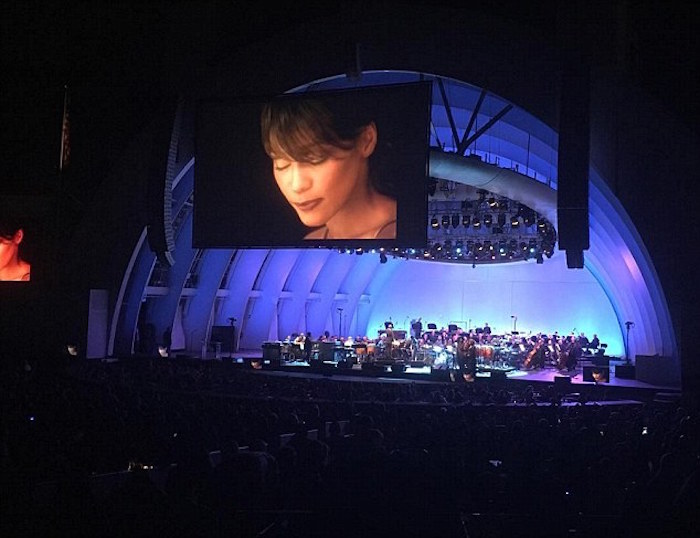
Remembered: Whitey Houston and Prince were paid tribute on the night
Lalah Hathaway ended the tribute with a powerful rendition of ‘Purple Rain’ to a audience who lit up the stadium with their cell phone lights singing along as the stage hummed to the hue of the colour purple.
The night ended with the Oscar award winning song ‘Glory, performed by Common and guest sung with Alice Smith to the film by the same name ‘Glory’.
Source: Here
Comment
+ Permalink
9/1/2016 by Gail Mitchell
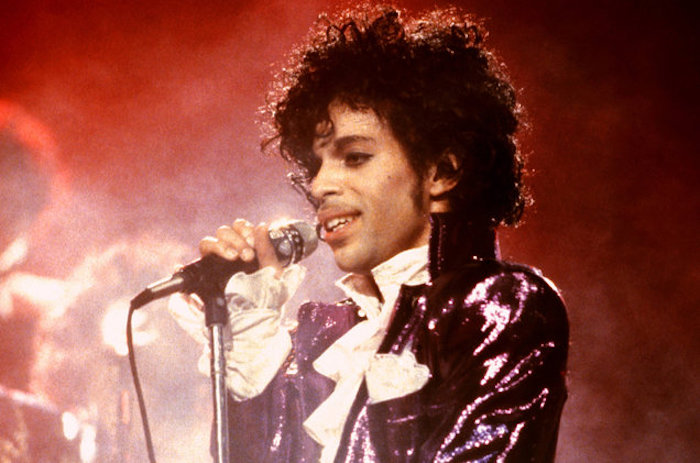
Ebet Roberts/Redferns
Prince performs during the Purple Rain tour.
While co-hosting a special screening of Prince’s Purple Rain in association with the Academy of Motion Pictures Arts and Sciences earlier this week, writer/director Reginald Hudlin hinted that last night’s (Aug. 31) “The Black Movie Soundtrack II” at the Hollywood Bowl would be “the sickest show ever.”
And the concert did indeed notch some memorable high notes as Common, Earth, Wind & Fire, Kenneth “Babyface” Edmonds, Gladys Knight, Charlie Wilson and more brought to life the rich, diverse and vibrant legacy of black cinema and its music. Or as AMPAS president Cheryl Boone Isaacs so aptly pointed out before the show started, “We’re here to celebrate the ways in which black movie music matters.”
Here are five top moments from the show:
Best joke of the night: The first movie spotlighted was 1941’s Hellzapoppin’, in particular a frenetic dance sequence—a precursor to Dirty Dancing and Footloose—featuring black dancers Slim Gaillard, Slam Stewart and Whitey’s Lindy Hoppers doing the Lindy Hop. Host Craig Robinson later explained the sequence was filmed as a self-contained segment. That way, the segment could easily be cut out of the movie when it was shown to Southern audiences. To cheers and whoops from the audience, Robinson said, “Today, we call them Trump supporters.”
Knight sings Claudine: Gladys Knight claimed the evening’s first standing ovation with a suite of songs from the 1974 film starring Diahann Carroll and James Earl Jones. Curtis Mayfield produced the soundtrack, which included six songs he wrote for Knight & the Pips. Knight’s searing and soaring vocals on “Make Yours a Happy Home,” “On and On” and, especially, “The Makings of You” took the worshipful audience to church and back.
Maurice White remembered: Earth, Wind & Fire members Verdine White, Philip Bailey and Ralph Johnson saluted the group’s founder/visionary while reprising a trio of movie-featured songs: “Got to Get You Into My Life,” “September” and “That’s the Way of the World.” The latter turned into a Bowl sing-along, set off by Bailey’s on-point falsetto and Paul Jackson Jr.’s standout guitar solo.
Long live Prince: Prince fans in the house knew exactly what was up when the Hollywood Bowl Orchestra and music director/bassist Marcus Miller’s band (including Jackson Jr., John Beasley and Kris Bowers) delivered a poignant take on “Venus de Milo” from 1986’s Under the Cherry Moon. Next came scream and shout-drawing performances “Take Me With You” (a duet with Charlie Wilson and Lalah Hathaway), “When Doves Cry” (movingly rendered by former Prince backup singer Chance Howard), “If I Was Your Girlfriend” (Alice Smith) and Wilson returning for a foot-stomping turn on “Baby, I’m a Star.” But it was Hathaway, R&B legend Donny Hathaway’s Grammy-winning daughter, whose sonorous vocals brought everyone to their feet (phone flashlights in tow) with a mesmerizing cover of “Purple Rain.”
A moment of “Glory.” The show’s fitting finale featured Common and Smith performing “Glory,” the Oscar- and Grammy-winning song written and performed by Common and John Legend. “It didn’t get all the praise it deserved,” said Robinson of the original song featured in Selma. “But its music reaches into our souls with honesty and truth.”
Rounding out “The Black Movie Soundtrack II” lineup: a revisit of Babyface’s movie music resume with the man himself, Judith Hill and Hathaway, including songs from Boomerang (“Love Shoulda Brought You Home”) and Waiting to Exhale (“Exhale [Shoop Shoop]”). Full Force paid homage to the ‘90s with “Ain’t My Type of Hype” from the Hudlin-directed cult classic House Party.
Created and produced by Hudlin, Grammy winning-musician Miller and the Los Angeles Philharmonic Association in association with AMPAS, “The Black Movie Soundtrack” series launched in 2014 with Robinson as host. Hudlin, who produced this year’s Oscar telecast, said he’s already planning a third installment. “I’ve still got 100 songs to go,” he told a cheering Hollywood Bowl audience.
Comment
+ Permalink
By Dr. Valerie Wardlaw, Contributing Writer, Published September 8, 2016
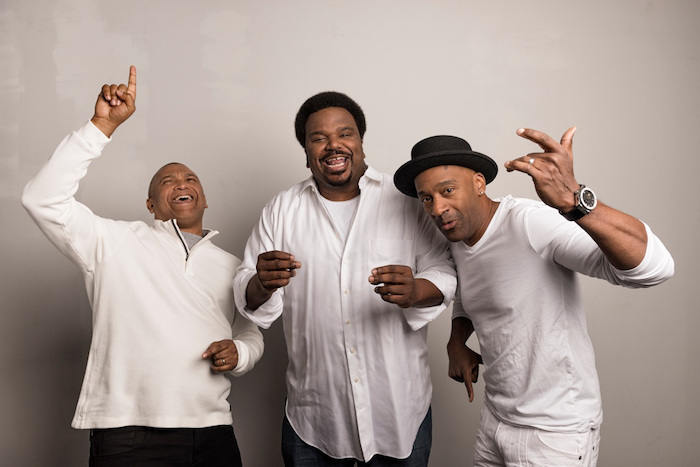
Creator/Producer Reginald Hudlin, Host Craig Robinson, and Grammy Winner Marcus Miller. Courtesy Photo
On Wednesday, August 31, 2016, at the famed Hollywood Bowl – Kenneth ‘Babyface’ Edmonds, Charlie Wilson, Marcus Miller, Gladys Knight, Common, Philip Bailey, Lalah Hathaway, Verdine White and Ralph Johnson to name a few shared the stage for an evening that host Craig Robinson called “a hug for your soul.” And that it was. The Black Movie Soundtrack II, a live event created and produced by filmmaker Reginald Hudlin, Grammy-winning bassist Marcus Miller, and the Los Angeles Philharmonic Association in association with the Academy of Motion Pictures Arts and Sciences (AMPAS) paired live performances with clips from some of the best and favorite Black movies from the 1940’s to 2014. Producer Reginald Hudlin more than delivered on his promise that this year’s show would be the “sickest show ever.”
The night began with a montage of movie scenes (edited by the very talented Laura Gibson) featuring Black actors that we know and love (Sidney Poitier, Lena Horne, Denzel Washington, Samuel Jackson, Halle Berry, Spike Lee, Angela Bassett) to the “Theme from Shaft,” the Oscar winning song that sounds as good (if not better) than it did when we first heard it in 1972. In a recent interview, producer Marcus Miller revealed that Isaac Hayes “once told me he was asked to shorten the track. He stuck to his guns, which absolutely contributes to the epic feeling of the tune.” The crowd roared in its affirmation that the song deserved every award it received.
You knew you were in for a night filled with surprises, when the crowd whooped it up after seeing the infamous scene from “Waiting to Exhale,” you know…the one when Angela Bassett as Bernadine Harris, calm cool, and collected as ever sets her soon to be ex-husband’s car on fire after finding out that he was unfaithful and wanted a divorce.
First up was the fantastic “Hellzapoppin”, a 1941 movie with a dance sequence like you’ve never seen before featuring Black dancers Slim Gaillard, Slam Stewart, and Whitey’s Lindy Hoppers doing the Lindy Hop. Host Craig Robinson explained that the dance scene was filmed as a self-contained sequence so that the dance scene could be cut out of the movie when it was shown to Southern audiences. To the delight of the audience, Robinson quipped that “Today, we call them Trump supporters.”
The next stop was the Black Exploitation period where Isaac Hayes’ “Theme from Shaft” was performed by none other than the energetic and ageless Charlie Wilson (Uncle Charlie), the wonderful Kenneth “Babyface” Edmonds, and the sultry songstress Lalah Hathaway (yes – Donnie’s daughter). Accompanied by the Hollywood Bowl Orchestra under the direction of Vince Mendoza, and the Marcus Miller combo, the music was simply heavenly when required and funky when necessary. Babyface would command the stage with his performance of “Super Fly,” from the 1972 film of the same name. His performance was followed by Lalah Hathaway’s performance of “Ghetto Boy, with both songs written by the late, prolific, and gifted songwriter Curtis Mayfield.
When scenes from the movie “Claudine” appeared on the screen, you knew it was time for the magnificent and lovely Gladys Knight, who performed three of the six songs written by Curtis Mayfield for “Claudine”: “Make Yours a Happy Home,” “The Makings of You,” and “On and On.” Did I mention that guitarist Marcus Miller, (the baddest bass player ever) accompanied Knight for this soulful walk down memory lane?
The magical night continued with a tribute to the visionary founder of Earth, Wind, and Fire – Maurice White, from Philip Bailey, Verdine White, and Ralph Johnson who performed a scrumptious medley accompanied by the outstanding guitar work of Paul Jackson Jr: “Got to Get You Into My Life,” “That’s the Way of the World,” and “September.”
After intermission, the show continued with Marcus Miller and the Hollywood Bowl Orchestra performing the 1986 tune “Under the Cherry Moon,” setting off a tribute that brought hundreds to their feet, lighting up the Bowl with their camera phones in a moving tribute to the artist we love and miss – Prince. Wilson and Hathaway performed “Take Me With You,” Chance Howard (a former Prince backup singer) movingly performed “When Doves Cry.” Alice Smith sang “If I Was Your Girlfriend,” Wilson returned to the stage performing “Baby, I’m a Star,” and Hathaway ended the tribute with a soul-stirring cover of “Purple Rain.”
Then it was truly party-time as the hip-hop group Full Force took the stage following scenes from the cult-classic, “House Party,” (a Reginald Hudlin film). Full Force got it poppin’ with “Ain’t My Type of Hype,” (among a medley of other songs– “Poison,” “Hold Up, Wait a Minute”) from the aforementioned movie with a special appearance by one of the stars of the movie, AJ Johnson (Sharane in House Party) whose dance moves proved that age is nothing but a number.
Babyface, Howard, Judith Hill, and Hathaway took the stage to perform music from “Boomerang,” and “Waiting to Exhale,” showcasing the extraordinary talent of Babyface. The medley included “Love Shoulda Brought You Home,” (performed by Hathaway), “Sittin Up in My Room,” (performed by Hill), “Give U My Heart,” (performed by Babyface), and one of the most poignant moments of the night, Whitney Houston on the screen singing “Shoop, Shoop” from “Waiting to Exhale.”
The show’s finale featured the Oscar winning artist Common and Alice Smith performing the Oscar and Grammy-winning song “Glory,” written by John Legend and Common from the movie “Selma.” As co-host Robinson said, “It didn’t get all the praise it deserved but the music reaches into our souls with honesty and truth.” It was a fitting ending to a phenomenal night. As Cheryl Boone Isaacs said, President of AMPAS said, “Black movie music matters.” The good news? Producer Hudlin said at the top of the show, “I’m already planning a third installment. I’ve still got 100 songs to go.” Oh…glory!
Comment
+ Permalink







